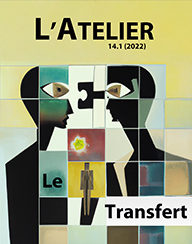Abstract
The father motif is studied through the lens of re-writing in Jerome Charyn’s works of fiction, nonfiction, autofiction, as well as prefaces and interviews. In those pages, the biological father is endowed with a literary presence and thus “transferred” from the unconscious to the consciousness of writing. As the son selectively remembers his dysfunctional father, a shellshocked Polish immigrant, a series of texts gradually develops on him. This portrait is oblique and serial, because it does not rely on a unique text and is formed by an accumulation of images: repetition and imitation first make for a hyperbolized characterization of Sam Charyn as an « idiot », ridiculous in the eyes of his child, before allowing for more polysemous variations on the father theme. Such a literary rumination encourages Charyn to verbalize trauma, that of his illiterate childhood spent in the post-war Bronx with a violent father, in the form of a textual palimpsest. In so doing he steps away from it, aided by the process of language which both permits distance from the father and enhances closeness with him. This literary echolalia works not as a rational method but as an affective process that involves forgetting and recreating the father, and which ultimately gives birth to a renewed meaning of filiation.
Keywords : trauma, memory, repetition, fatherhood, echolalia, idiocy, autofiction
Downloads
Published
Issue
Section
License
- Work submitted for publication must be original, previously unpublished, and not under consideration for publication elsewhere. If previously published figures, tables, or parts of text are to be included, the copyright-holder's permission must have been obtained prior to submission.
- Authors of accepted manuscripts will assign to L'Atelier the right to electronically distribute their article, or publish it in any form (Internet, CD ROM, printed copy) but authors will retain copyright and, after the article has appeared in L'Atelier, authors may republish their text (in print and/or electronic form) as long as they clearly acknowledge L'Atelier as the original publisher.


